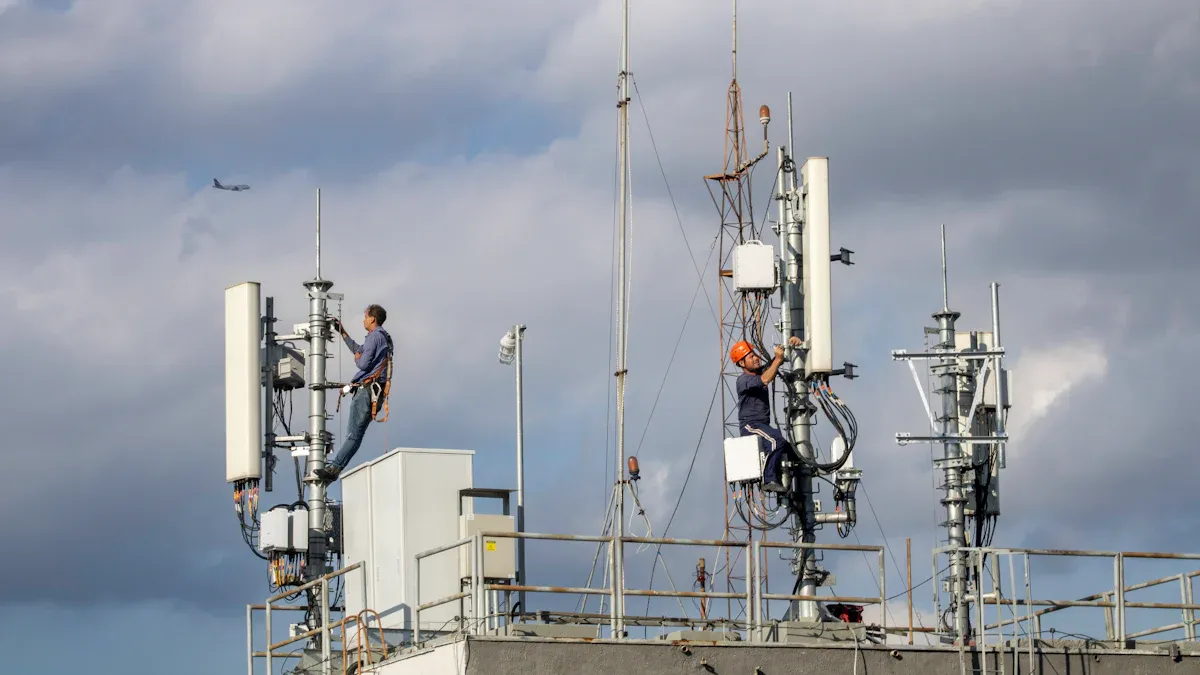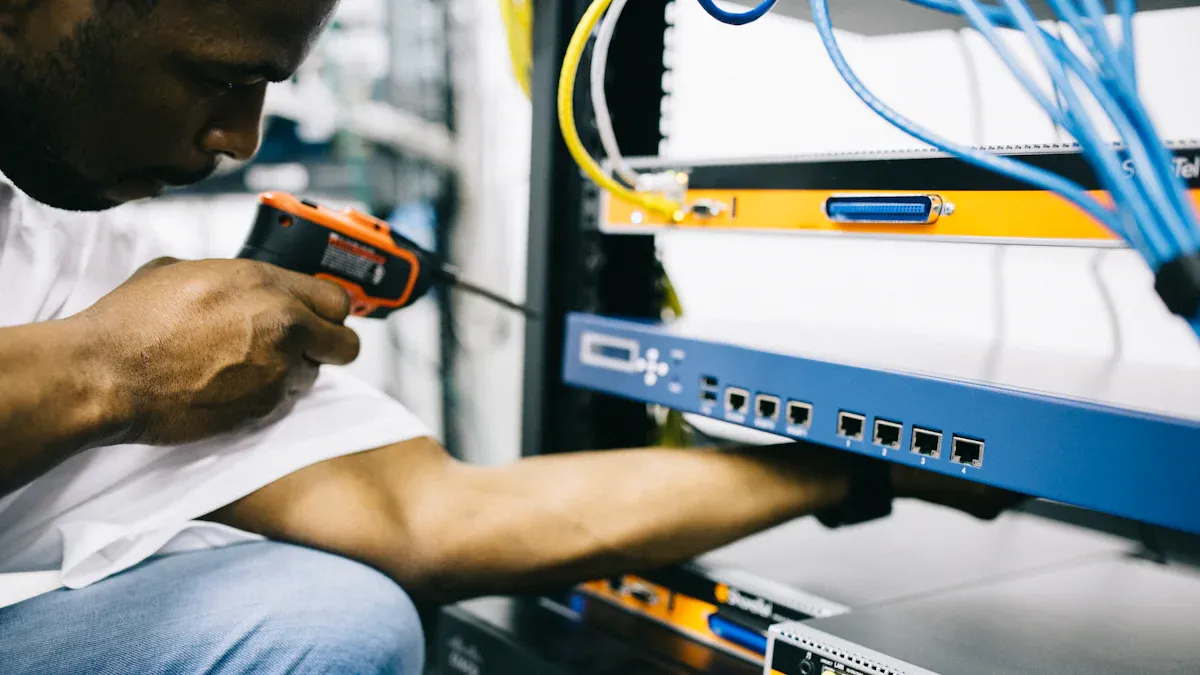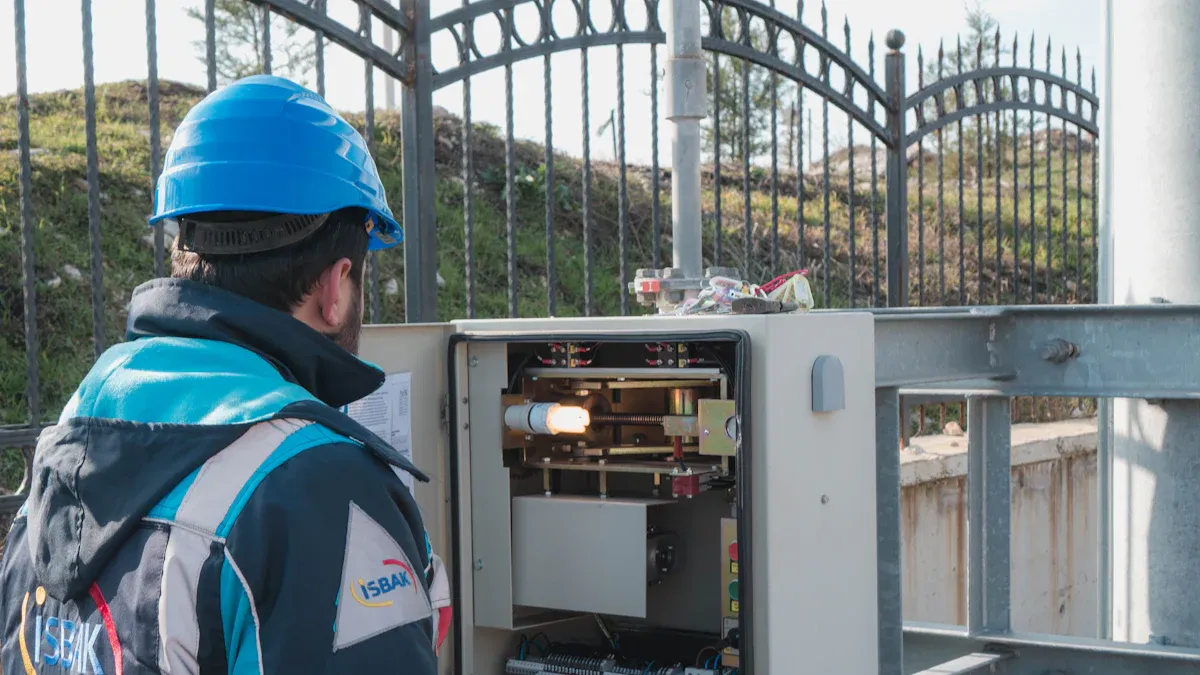Essential Tips for Maintaining Outdoor Network Cabinets

Outdoor network cabinets are important for protecting delicate equipment. They keep key parts safe from outside dangers and help them work without stopping. But tough weather can make them wear out faster. Extreme heat, cold, dust, and water can harm them and cause expensive problems.
Taking care of them regularly is very important. Checking them often and fixing issues quickly can save money. These cabinets also help save costs by improving fiber optic setups. They cut down on long cable needs and keep equipment safe, lowering repair costs. By taking care of them, you make sure they last longer and keep your network safe.
Key Takeaways
Check cabinets often. Look for rust, damage, or worn parts monthly to avoid expensive fixes.
Use weatherproof boxes with high IP ratings. These keep dust and water out, helping equipment work better.
Keep cables tidy and labeled. This improves airflow, makes fixing easier, and boosts network performance.
Add locks and cameras to cabinets. These steps keep your equipment safe from theft and damage.
Get cabinets ready for bad weather. Use covers and strong anchors to protect them from wind, rain, and snow.
Regular Maintenance for Outdoor Network Cabinets
Taking care of outdoor telecom cabinets often is very important. It keeps the equipment safe and avoids expensive repairs. By following a plan, you can make the cabinet last longer and work well.
Scheduling Routine Inspections
Regular checks are key to preventing problems. Plan inspections often to find issues early. Look for rust, damage, or worn-out parts. Focus on hinges, locks, and moving pieces. A steady schedule helps stop problems and protects your equipment.
Tip: Use a checklist for inspections. This helps you check everything important.
Identifying and Repairing Physical Damage
Damage can weaken outdoor telecom cabinets. Check for cracks, dents, or scratches that could let in water or dirt. Fix these problems quickly to stop them from getting worse. Use strong, weather-proof materials for repairs. Fixing damage early keeps your network working well.
Checking Seals and Gaskets for Wear and Tear
Seals and gaskets keep water, dust, and dirt out. Over time, they can break or stop working. Check them during maintenance to see if they are okay. Replace broken or old ones right away. This step keeps the cabinet safe and stops moisture or dirt from getting inside.
Note: Good sealing is very important, especially in bad weather.
Protecting Outdoor Telecom Cabinets from Environmental Damage

Outdoor telecom cabinets face tough weather all the time. Without good protection, they can break down fast. This can cause equipment to fail and cost a lot to fix. Using weatherproof solutions helps them last longer and work better.
Weatherproofing with High IP-Rated Enclosures
Weatherproof designs keep outdoor cabinets safe. High IP-rated enclosures stop dust and water from getting inside. IP ratings like IP65 or higher are tested to block moisture and dirt. These enclosures are great for places with heavy rain or dust storms.
High IP ratings block dust and water to protect parts.
IP tests check if enclosures stop moisture and dirt.
Use IP65 or higher-rated cabinets for better outdoor performance.
Tip: Pick enclosures with high IP ratings to make cabinets last longer.
Using Corrosion-Resistant Materials
Corrosion-resistant materials help outdoor cabinets last longer. Coastal and industrial areas can cause faster rusting. Using strong materials like aluminum-magnesium alloys or anti-rust coatings makes cabinets more durable.
Galvanized steel cabinets rust in about seven years near coasts.
Aluminum-magnesium alloy cabinets stay strong for over 15 years.
Anti-rust coatings add extra protection against rust and damage.
Weather-resistant materials keep cabinets strong in harsh conditions.
Installing Proper Ventilation Systems
Good ventilation keeps cabinets cool and dry inside. Without airflow, heat and moisture can harm equipment. Ventilation systems made for outdoor use help cabinets work in extreme weather.
Ventilation keeps cabinets cool and stops overheating.
It lowers moisture, stopping rust and water damage.
UV-resistant vents last longer in sunny areas.
Note: Check and clean vents often to keep airflow steady.
By using weatherproof designs, rust-proof materials, and good ventilation, you protect cabinets from damage. These steps save money on repairs and help cabinets last longer.
Managing Temperature and Humidity in Harsh Environments
Outdoor telecom cabinets face tough weather like heat and moisture. Keeping the right temperature and humidity is very important. It helps your equipment last longer and work well. Here’s how to keep the inside of your cabinets safe.
Adding Cooling and Heating Systems
Extreme temperatures can hurt the equipment inside cabinets. Heat inside can reach 55°C from powered devices. Too much heat can cause condensation, damaging parts. Cooling systems like fans or air conditioners stop overheating. In cold areas, heaters keep equipment working even in freezing weather.
High heat can break or damage equipment.
Airflow or cooling systems keep the temperature steady.
Tip: Pick energy-saving systems to lower costs and protect equipment.
Using Dehumidifiers and Desiccants
Moisture is a big problem for outdoor cabinets. High humidity can cause rust, corrosion, and failures. Dehumidifiers and desiccants help control moisture. Desiccant dehumidifiers use less energy and save money. In dry places, they can cut energy costs by over 60%, saving $5,000 to $20,000 yearly for large systems.
Dehumidifiers lower moisture, stopping rust and damage.
Desiccants soak up extra moisture, keeping cabinets dry.
Note: Change desiccants often to keep them working well.
Watching Internal Climate Conditions
Keeping the right temperature and humidity needs constant checking. Use sensors to watch inside conditions and get alerts for changes. These tools help you fix problems fast, protecting your equipment from heat and moisture.
Sensors show real-time temperature and humidity data.
Alerts let you act quickly to avoid damage.
By using cooling and heating systems, dehumidifiers, and sensors, you protect your cabinets. These steps keep your equipment safe and working for a long time.
Preventing Dust and Debris in Outdoor Network Cabinets
Dust and debris can hurt outdoor cabinets. They block airflow and damage equipment. Keeping cabinets clean helps them work well and last longer. Here are ways to stop dust and dirt.
Using Built-In Dust Filters and Screens
Dust filters stop dirt from getting inside cabinets. They block particles but still let air flow. Pick filters made for outdoor cabinets. Check and change clogged filters often to keep them working.
Tip: Use UV-resistant filters in sunny areas. They last longer and protect better.
Sealing Cable Entry Points
Dust can enter through cable openings. Seal these spots with weatherproof grommets or cable glands. These seals block dirt but let cables pass safely. Good sealing keeps cabinets safe from dust and debris.
Note: Check seals often, especially after adding new cables.
Regular Cleaning and Maintenance
Clean cabinets often to remove dust and dirt. Wipe surfaces inside and outside to stop buildup. Cleaning keeps airflow clear and equipment working. Regular care makes cabinets last longer and work better.
Cleaning removes harmful dust and dirt.
A schedule stops debris from piling up.
Maintenance keeps cabinets working well over time.
By using filters, sealing openings, and cleaning regularly, you protect cabinets. These steps keep your equipment safe and running smoothly.
Effective Cable Management for Outdoor Telecom Cabinets
Good cable management is key to keeping outdoor telecom cabinets in shape. It protects equipment, helps air move better, and makes maintenance easier. Neat cables can boost how well your network works and last longer.
Keeping Cables Neat and Labeled
Neat and labeled cables make fixing problems easier. When you label cables during setup, finding issues is quicker. You won’t waste time sorting through messy wires. Neat cables also make upgrades and repairs simpler.
Labels save time when fixing problems.
Neat cables are easier to reach and work with.
Good cable management helps air move and keeps devices cool.
Tip: Use strong, weatherproof labels so they last outside.
Using Cable Ties and Covers
Cable ties and covers are great for managing wires. Ties keep cables together and stop them from tangling or breaking. Covers protect cables from things like water and dirt. These tools keep cables safe and make cabinets look tidy.
Ties stop cables from tangling or breaking.
Covers keep cables safe from water and dirt.
Both tools protect your network and keep it neat.
Note: Pick UV-safe ties and covers for cabinets in sunny spots.
Spacing Cables for Better Airflow
Too many cables in one spot can cause overheating. Spread out cables to let air flow and keep devices cool. Neat cables also make fixing and checking equipment easier.
Spread cables to stop overheating.
Avoid signal problems by arranging cables well.
Neat cables make maintenance faster and easier.
Tip: Check cable setups often to keep air moving freely.
Good cable management keeps your equipment safe and working well. By keeping cables neat, using protective tools, and spacing them out, your network will run smoothly and last longer.
Enhancing Security for Outdoor Network Cabinets
Outdoor telecom cabinets face risks like theft and vandalism. Improving their security keeps equipment safe and avoids costly problems. Here are simple ways to make them more secure.
Installing Lockable Cabinets
Lockable cabinets are a strong way to protect equipment. Good locks stop people from messing with your devices. Pick cabinets with tamper-proof locks for extra safety. Check locks often to make sure they work well. Secured cabinets protect equipment and reduce theft or damage.
Tip: Use keyless locks, like combination locks or keypads, for easier access.
Adding Surveillance Systems
Cameras help watch and protect outdoor telecom cabinets. They scare off thieves and let you see what’s happening. Modern cameras with smart features, like alerts, improve safety. Big companies use these systems to stop theft and protect equipment.
Over 60% of businesses think security systems are very important.
FBI reports show more burglaries at business locations each year.
Cameras lower the chances of theft and damage.
Adding cameras makes your equipment safer and lowers risks.
Preventing Unauthorized Access
Stopping unauthorized access needs barriers and smart tools. Use alarms and motion sensors to catch intruders. Seal cable openings to stop tampering. Only allow trusted people to access the cabinets. These steps keep your equipment safe from harm.
Note: Update access permissions often and check logs for better security.
By using lockable cabinets, cameras, and access controls, you protect your telecom cabinets. These actions improve security and keep your network running smoothly.
Preparing Outdoor Cabinets for Extreme Weather

Outdoor cabinets face tough weather that can harm equipment. Getting them ready for bad conditions keeps your network safe.
Strengthening Cabinets for Strong Winds
Strong winds can break or tip outdoor cabinets. Make them stronger to handle heavy gusts. Use cabinets rated at least NEMA 3 in windy areas. For hurricanes, pick NEMA 4X cabinets for extra strength. Attach cabinets to solid bases with strong anchors. This stops them from moving during storms and protects your equipment.
Tip: Check anchors often to ensure they stay tight after storms.
Adding Waterproof Covers for Heavy Rain
Rain can leak into cabinets and ruin equipment. Waterproof covers add extra protection from water. Pick tough, weatherproof covers that fit tightly. Use NEMA 3RX cabinets in places with rain and saltwater. Install drain plugs to let water out and stop flooding.
Protection Step | Details |
|---|---|
NEMA Ratings | Use NEMA 3 for wind, NEMA 3RX for marine areas, and NEMA 4X for hurricanes. |
Flood Prevention | Place cabinets higher and use drain plugs to avoid flooding. |
Note: Check waterproof covers often for damage to keep them working well.
Guarding Against Snow and Ice
Snow and ice can block airflow and harm cabinets. Use insulated covers to stop ice buildup and keep cabinets warm. Add heaters to melt snow and ice around them. Cabinets with FM Global "Very Severe Hail Rating" can also handle hailstorms.
Tip: Remove snow and ice quickly to prevent lasting damage.
By strengthening cabinets, using waterproof covers, and guarding against snow and ice, you protect your outdoor cabinets. These steps keep your equipment safe and lower repair costs.
Taking care of outdoor network cabinets in tough weather keeps them working well and lowers repair costs. Regular checks and smart actions protect your equipment and help your network run better. For example, checking cabinets every month stops rust, and cleaning connections keeps signals strong. Watching the weather also helps keep the equipment in good shape.
Benefit | Description |
|---|---|
Lasts longer | Regular care helps the cabinet work well for years. |
Saves money | Early fixes stop big problems and costly repairs. |
Better network performance | Routine checks improve how the network works and stays online. |
By focusing on maintenance, you make your outdoor cabinet last longer and keep your network running smoothly. Start today to save money, improve efficiency, and protect your equipment for the future.
FAQ
What’s the easiest way to clean outdoor cabinets?
Wipe surfaces with a soft cloth and mild soap. Don’t use harsh cleaners that might scratch the surface. Clean vents and filters often to keep air flowing well.
Tip: Clean cabinets every month to stop dust and keep them working great.
How often should outdoor cabinets be checked?
Check cabinets at least once a month. Look for cracks, rust, or worn-out seals. Regular checks help you find problems early and save money on repairs.
Note: Use a checklist to make sure you check everything important.
Can bad weather harm outdoor cabinets?
Yes, bad weather like heavy rain, snow, or strong winds can damage them. Use waterproof covers, strong designs, and heaters to protect your cabinets.
Weather Type | How to Protect |
|---|---|
Heavy Rain | Use waterproof covers |
Snow/Ice | Add insulated covers & heaters |
What materials work best for outdoor cabinets?
Materials like aluminum-magnesium alloys or galvanized steel are best. They resist rust and last longer in tough conditions.
Tip: Pick cabinets with anti-rust coatings for extra protection in salty or polluted areas.
How can you stop people from breaking into cabinets?
Use cabinets with strong locks that can’t be tampered with. Add cameras and motion sensors for extra safety. Only let trusted people open the cabinets.
Emoji Reminder: 🔒 Lock your cabinets to keep your equipment safe!
See Also
Essential Advice for Caring for Outdoor Telecom Cabinets
Requirements for Durable Outdoor Telecom Cabinets
Safeguarding Outdoor Communication Cabinets Through Effective Care
Ensuring Equipment Safety with Outdoor Telecom Cabinets
Guidelines for Setting Up ESTEL Outdoor Cabinets in Tough Environments
CALL US DIRECTLY
86-13752765943
3A-8, SHUIWAN 1979 SQUARE (PHASE II), NO.111, TAIZI ROAD,SHUIWAN COMMUNITY, ZHAOSHANG STREET, NANSHAN DISTRICT, SHENZHEN, GUANGDONG, CHINA
